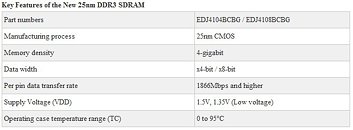- Joined
- Oct 9, 2007
- Messages
- 47,528 (7.48/day)
- Location
- Hyderabad, India
| System Name | RBMK-1000 |
|---|---|
| Processor | AMD Ryzen 7 5700G |
| Motherboard | ASUS ROG Strix B450-E Gaming |
| Cooling | DeepCool Gammax L240 V2 |
| Memory | 2x 8GB G.Skill Sniper X |
| Video Card(s) | Palit GeForce RTX 2080 SUPER GameRock |
| Storage | Western Digital Black NVMe 512GB |
| Display(s) | BenQ 1440p 60 Hz 27-inch |
| Case | Corsair Carbide 100R |
| Audio Device(s) | ASUS SupremeFX S1220A |
| Power Supply | Cooler Master MWE Gold 650W |
| Mouse | ASUS ROG Strix Impact |
| Keyboard | Gamdias Hermes E2 |
| Software | Windows 11 Pro |
Elpida Memory, Inc., the Japan-based third largest Dynamic Random Access Memory (DRAM) maker in the world, today announced it had completed development of the industry's first 25-nanometer (nm) process 4-gigabit DDR3 SDRAM. The new chip is also the smallest 4-gigabit DRAM. The new cutting-edge smallest available 4-gigabit chip uses ultra fine-width 25nm process migration technology. Back in May, Elpida finished development of a 2-gigabit DDR3 SDRAM using the advanced 25nm process and began sample shipments in July.
By using ultra-fine process technology the 4-gigabit DDR3 SDRAM becomes a more energy efficient chip and achieves higher productivity. As a 4-gigabit product, its density is double that of Elpida's 2-gigabit DDR3 SDRAM based on the same process node. The newly developed 4-gigabit DRAM enhances productivity by about 45% compared with Elpida's 30nm 4-gigabit DDR3 SDRAM. Compared with this same 30nm DDR3, it reduces operating current by about 25-30% and standby current by about 30-50%. It has also realized the industry's highest speed data transfer rate.
DRAM is the indispensable working memory for supporting information processing in personal computers, mobile phones and many other kinds of electronic appliances. In recent years, there has been an explosive increase in demand for solutions to instantaneous processing of music, pictures, video and other high-density data. DRAMs used in those applications must be capable of not only faster speeds but also lower power consumption.
The new 25nm DDR3 SDRAM is expected to find applications in PCs and in servers used in data centers and other facilities that perform large-scale information processing tasks. Other applications are likely to include tablet PCs and UltraBook (an ultra-thin notebook PC).
Elpida, a leading company in the DRAM industry, is focused on design and development of high-density and low-power DRAMs. As a leading provider of memory solution company, Elpida is committed to provide the most advanced products.
Sample shipment and mass production of the new 25nm 4-gigabit DDR3 SDRAM is expected to start by the end of this year.

View at TechPowerUp Main Site
By using ultra-fine process technology the 4-gigabit DDR3 SDRAM becomes a more energy efficient chip and achieves higher productivity. As a 4-gigabit product, its density is double that of Elpida's 2-gigabit DDR3 SDRAM based on the same process node. The newly developed 4-gigabit DRAM enhances productivity by about 45% compared with Elpida's 30nm 4-gigabit DDR3 SDRAM. Compared with this same 30nm DDR3, it reduces operating current by about 25-30% and standby current by about 30-50%. It has also realized the industry's highest speed data transfer rate.
DRAM is the indispensable working memory for supporting information processing in personal computers, mobile phones and many other kinds of electronic appliances. In recent years, there has been an explosive increase in demand for solutions to instantaneous processing of music, pictures, video and other high-density data. DRAMs used in those applications must be capable of not only faster speeds but also lower power consumption.
The new 25nm DDR3 SDRAM is expected to find applications in PCs and in servers used in data centers and other facilities that perform large-scale information processing tasks. Other applications are likely to include tablet PCs and UltraBook (an ultra-thin notebook PC).
Elpida, a leading company in the DRAM industry, is focused on design and development of high-density and low-power DRAMs. As a leading provider of memory solution company, Elpida is committed to provide the most advanced products.
Sample shipment and mass production of the new 25nm 4-gigabit DDR3 SDRAM is expected to start by the end of this year.

View at TechPowerUp Main Site






